This article was medically reviewed by Janice Litza, MD. Dr. Litza is a board certified Family Medicine Physician in Wisconsin. She is a practicing Physician and taught as a Clinical Professor for 13 years, after receiving her MD from the University of Wisconsin-Madison School of Medicine and Public Health in 1998.
There are 29 references cited in this article, which can be found at the bottom of the page.
This article has been viewed 68,073 times.
Kidney pain can be due to injury, infection, stones, or inflammation in your kidney. Often this feels like a dull ache in your upper back or side, usually on only one side of your body.[1] The goal is to diagnose and treat the underlying cause of the pain, so see your doctor right away. In the meantime, alleviate your pain with simple remedies or medications.
Steps
Alleviating Discomfort
-
1Stay hydrated. Drink plenty of fluids when you have kidney pain.[2] If the pain is due to infection, the water may help flush out bacteria. Staying hydrated can also help to prevent kidney stones. In general, men should drink around 13 cups of water and other fluids daily (about 3 liters), and women should aim for 9 cups (2.2 liters).[3] Water, juice, and tea count towards your fluids. Drinking cranberry juice may be a natural way to flush out your kidneys.[4]
-
1Apply a heat pack. Use a heating pad on your back, flank, or abdomen to minimize pain. This will not cure the underlying cause of your kidney pain, but can make you more comfortable. You can also soak in a hot bath or shower.[7]
-
2Take over-the-counter pain medicine containing acetaminophen. OTC pain medication can help to alleviate kidney pain. Take the right kind of pain medicine – use products that contain the ingredient acetaminophen, like Tylenol. Other OTC pain medications can cause harm to your kidneys. When in doubt, ask your doctor or a pharmacist if a medication is safe to take.[8]
- Stay away from aspirin products.[9]
- Most pain medications are meant for short-term use.[10] If your pain is chronic (long-lasting) discuss pain management with your doctor. OTC acetaminophen products may still be appropriate.
- OTC pain medications can often be used to treat mild pain caused by polycystic kidney disease, an inherited disorder that causes chronic kidney pain as well as high blood pressure.[11]
-
3Drink lemon juice. Some people find lemon juice to help ease kidney pain associated with kidney stones, and it has even been show to work well as a preventative for kidney stones. This is because lemon contain citric acid, which helps to coat the stones and prevents them from getting any bigger. You can get the benefits of citric acid by drinking four ounces of lemon juice per day (diluted in water) or by drinking 32 ounces of lemonade per day.[12]
-
4Try drinking a cup of coffee or tea. You should see your doctor any time you have kidney pain, but drinking coffee or tea may help to prevent the recurrence of kidney stones.[13] One study showed that drinking caffeinated beverages like regular coffee and black tea may help to reduce your risk of kidney stones.[14]
- However, do not dramatically increase your intake of caffeinated beverages. Caffeine is a diuretic, so it can dehydrate you if you get too much of it. Try to stick to one or two cups of coffee or tea per day.[15]
-
5Take Chanca Piedra for natural kidney stone relief. Use lab grade Chanca Piedra, an herbal remedy, to alleviate pain from kidney stones.[16] This herb may also prevent recurrence of kidney stones [17] Purchase this supplement from a reputable source – get only Chanca Piedra grown in the United States that’s classified as “lab grade.” This supplement has not been scientifically studied, so check with your doctor before using it.
- Taking chanca piedra has not been shown to get rid of kidney stones on its own, but there is some evidence that taking chanca piedra over the course of three or more months after having shockwave therapy can help your body pass stones located in the lower urinary tract.
- Lithium and anti-diabetic medications interact with chanca piedra, so avoid taking chanca piedra if you are on these types of medications.[18]
- Disolvatol and Parcel Chanca-Piedra are two brands that may be purer than others. These may be available at your pharmacy, or you can purchase them online. Use it only as directed on the bottle.
Getting Diagnosed
-
1Visit your doctor. See your doctor any time you have kidney pain. Call for an appointment if you experience pain in your back or flank (your side under and below your ribs) that is dull, aching, and constant.[19]
- You may have other symptoms like fever, fatigue, body aches, or blood in your urine. Depending on the reason for the kidney pain, you may not have other symptoms. See your doctor if you have pain, without or without other symptoms.[20]
- If you have even mild kidney pain but you recently had a urinary tract infection (UTI), see your doctor – it’s important to make sure the infection didn’t spread to your kidneys.
-
2Watch for prostate conditions. Older men may suffer from kidney pain and UTIs as a result of prostate issues, and these issues are often treatable. Some symptoms to watch out for include:[21]
- Needing to urinate often, including in the middle of the night
- Painful urination or ejaculation
- Blood in urine or semen
- Pain in your lower back, thighs, hips, pelvis, or rectal area
- Dribbling urine
-
3Get emergency help if your pain is sudden and severe. Severe kidney pain that occurs all of a sudden can be a sign of a serious medical condition like a blood clot or bleeding in your kidney. Call emergency services or visit the Emergency Department at your local hospital, even if you have no other symptoms.[22]
-
4See the appropriate specialist. Often, your regular doctor can treat your kidney pain if it’s due to a common infection or kidney stones. Other causes, however, may require help from a specialist like a urologist or a nephrologist. You may even need to see a surgeon. Ask your doctor for the appropriate referral.[23]
-
5Have diagnostic tests done. Prepare to have a number of tests done when you visit your doctor or go to the hospital. It’s likely that they will take a blood test and urine sample. Depending on what your doctor thinks might be causing your kidney pain, they may suggest you have an ultrasound, x-ray, CT, or MRI. Ask your doctor any questions you have about the tests.
Treating the Underlying Cause
-
1Get rid of kidney stones. Kidney stones usually cause severe pain that is “colicky” – crampy pain that comes and goes. If your doctor diagnoses you with kidney stones, you’ll likely spend a few days waiting to see if you can pass them on your own. This can be painful! Try pain relief at home, or ask your doctor for stronger pain medication. If you need medical assistance passing the stones, there are a number of treatments you can get in the hospital.[24]
- Stay well-hydrated to help prevent kidney stones from recurring.
-
2Seek medical care with antibiotics if you have an infection. If you recently had a UTI and now you’re having kidney pain, the infection from your bladder may have travelled up into your kidney. This type of kidney infection, called pyelonephritis, has to be treated quickly to prevent kidney damage. Try to see your doctor right away, and if you can’t get a same-day appointment, go to the hospital – they will give you antibiotics to treat the infection. For severe infections, you might have to stay in the hospital and have antibiotics through an IV (intravenously, or through a needle into your vein).[25]
- Salpingitis, an infection of the fallopian tubes in women is sometimes called pelvic inflammatory disease, can also cause kidney-like pain. Salpingitis also requires antibiotics.[26]
- Always take antibiotics exactly as your doctor prescribes.
-
3Have surgery. Sometimes, kidney pain is caused by a structural problem. Usually this requires having surgery to fix whatever problem is causing your pain. Surgery might also be necessary to remove a kidney, like if your pain is caused by a tumor. Having all or part of your kidney removed can help to manage your pain and prevent cancer from spreading.[27]
- Most structural problems are diagnosed in children. ”Horseshoe kidney,” when the kidneys fuse together, is a common cause of kidney pain.[28]
- If you can’t have surgery for some reason, your cancer team can treat your kidney tumor with chemotherapy and/or radiation. When the tumor shrinks, your pain may improve.[29]
-
4Improve the state of your arteries. Arteriosclerosis and atherosclerosis, when your arteries harden or get clogged with plaque, can occur in any artery in your body – this is what leads to heart attacks and strokes. When this occurs in the blood vessels to your kidneys, you can get high blood pressure, kidney failure, and kidney pain. Talk to your doctor about your cholesterol level and whether you should take medication for it. Controlling chronic medical diseases, such as high blood pressure and diabetes, is also important for kidney health. You can also improve the quality of your blood vessels by making healthy lifestyle choices:[30]
- Eat a low-fat and low-cholesterol diet
- Exercise regularly, at least 5 days a week for 30 minutes
- Don’t smoke
- Maintain a healthy weight
Expert Q&A
-
QuestionDo these symptoms count for kids as well as adults? Is chest pain while I am growing natural?
 Claudia Carberry, RD, MSClaudia Carberry is a Registered Dietitian specializing in kidney transplants and counseling patients for weight loss at the University of Arkansas for Medical Sciences. She is a member of the Arkansas Academy of Nutrition and Dietetics. Claudia received her MS in Nutrition from the University of Tennessee Knoxville in 2010.
Claudia Carberry, RD, MSClaudia Carberry is a Registered Dietitian specializing in kidney transplants and counseling patients for weight loss at the University of Arkansas for Medical Sciences. She is a member of the Arkansas Academy of Nutrition and Dietetics. Claudia received her MS in Nutrition from the University of Tennessee Knoxville in 2010.
Master's Degree, Nutrition, University of Tennessee Knoxville Master's Degree, Nutrition, University of Tennessee KnoxvilleExpert AnswerIf you are experiencing chest pain, tell your parents and contact your doctor immediately.
Master's Degree, Nutrition, University of Tennessee KnoxvilleExpert AnswerIf you are experiencing chest pain, tell your parents and contact your doctor immediately.
Warnings
- A number of different problems – from kidney stones to infection – can cause urine to back up into your kidneys, causing kidney pain, pain with urination, and fever. See your doctor to treat the underlying cause of this problem, called hydronephrosis. You may need to have the extra urine medically drained from your bladder so it doesn’t damage your kidneys.[31]⧼thumbs_response⧽
References
- ↑ http://www.mayoclinic.org/symptoms/kidney-pain/basics/definition/sym-20050902
- ↑ https://my.clevelandclinic.org/health/diseases/15604-kidney-stones
- ↑ https://www.kidney.org/content/6-tips-be-water-wise-healthy-kidneys
- ↑ https://my.clevelandclinic.org/health/diseases/15604-kidney-stones
- ↑ https://www.kidney.org/newsletter/coffee-and-kidney-disease
- ↑ https://www.kidney.org/news/kidneyCare/winter10/AlcoholAffects
- ↑ https://www.urologyspecialistsnc.com/relieve-kidney-pain/
- ↑ https://www.goodrx.com/acetaminophen/is-tylenol-acetaminophen-bad-for-your-liver-or-kidneys
- ↑ https://www.kidney.org/atoz/content/painmeds_analgesics
- ↑ https://my.clevelandclinic.org/health/treatments/12058-pain-relievers
- ↑ https://www.mayoclinic.org/diseases-conditions/polycystic-kidney-disease/diagnosis-treatment/drc-20352825
- ↑ https://www.uwhealth.org/files/uwhealth/docs/pdf/kidney_citric_acid.pdf
- ↑ https://academic.oup.com/advances/article/9/4/419/5055947?login=false
- ↑ https://www.ncbi.nlm.nih.gov/pubmed/25411295
- ↑ https://medlineplus.gov/ency/patientinstructions/000135.htm
- ↑ https://pubmed.ncbi.nlm.nih.gov/29617079/
- ↑ https://www.ncbi.nlm.nih.gov/pmc/articles/PMC6092661/
- ↑ https://www.rxlist.com/chanca_piedra/supplements.htm
- ↑ http://www.mayoclinic.org/symptoms/kidney-pain/basics/when-to-see-doctor/sym-20050902
- ↑ https://lifeoptions.org/learn-about-kidney-disease/kidney-disease-symptoms/
- ↑ https://www.nia.nih.gov/health/publication/prostate-problems
- ↑ http://www.mayoclinic.org/symptoms/kidney-pain/basics/when-to-see-doctor/sym-20050902
- ↑ https://www.bostonkidney.com/2019/08/09/nephrologist-vs-urologist/
- ↑ http://my.clevelandclinic.org/health/articles/kidney-stones
- ↑ https://www.aafp.org/afp/2005/0301/p933.html
- ↑ https://www.fairview.org/HealthLibrary/Article/40492
- ↑ https://www.providence.org/services/kidney-surgery#tabcontent-1-pane-2
- ↑ http://www.urologyhealth.org/urologic-conditions/horseshoe-kidney-(renal-fusion)
- ↑ https://www.cancer.net/cancer-types/kidney-cancer/types-treatment
- ↑ http://www.mayoclinic.org/diseases-conditions/arteriosclerosis-atherosclerosis/symptoms-causes/dxc-20167022
- ↑ https://www.kidney.org/atoz/content/hydronephrosis
About This Article
If you’re suffering from kidney pain, you should visit your doctor to make sure you don’t have an underlying condition. However, in the meantime, there are a few ways you can reduce your pain. Drink plenty of fluids, like water, lemon juice, and cranberry juice, which can flush out bacteria if you have an infection. Apply a heat pack or hot water bottle wrapped in a towel to your abdomen to reduce the pain. You can also take over-the-counter pain relievers if you're still in pain. If your pain is severe or comes on suddenly, go to the emergency department or call an ambulance. For more tips from our Medical co-author, including how to get rid of kidney stones, read on.


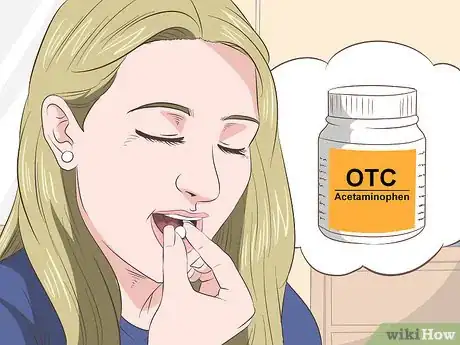
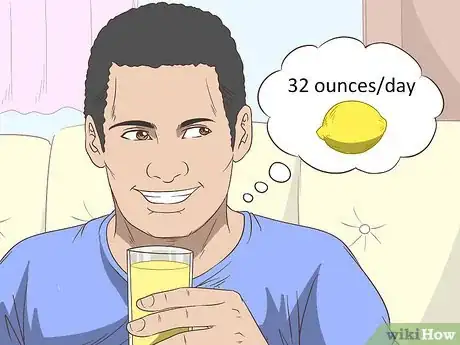

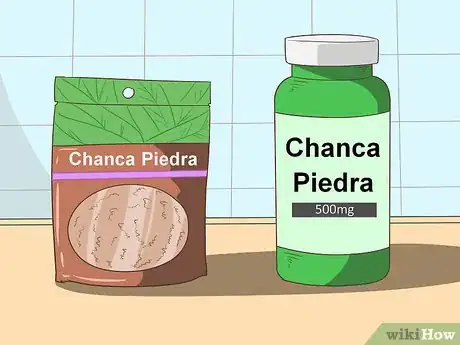

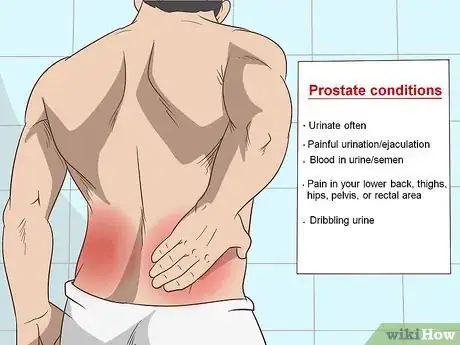
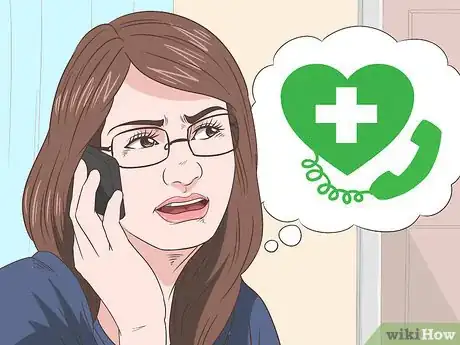
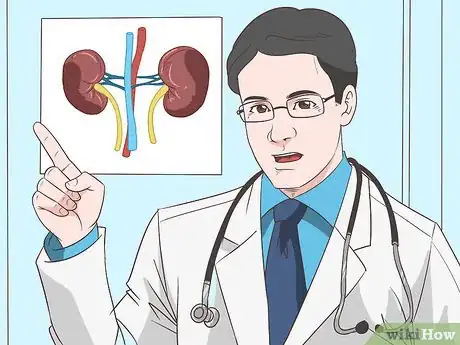

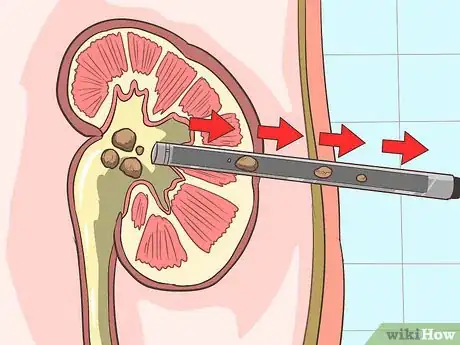
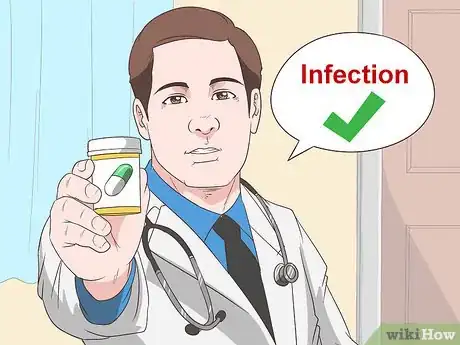
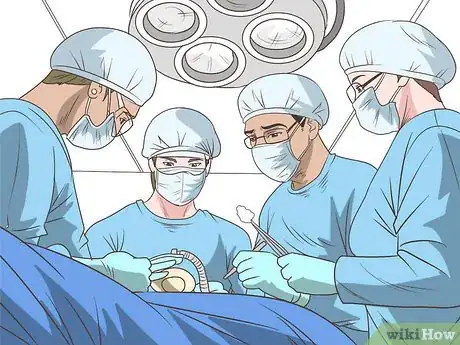

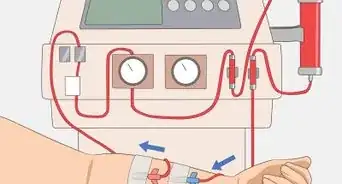
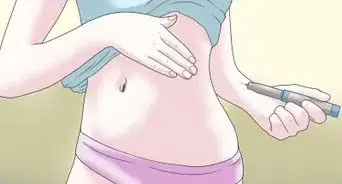
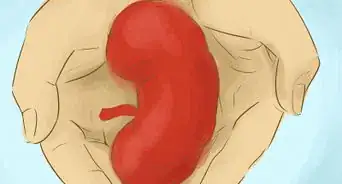
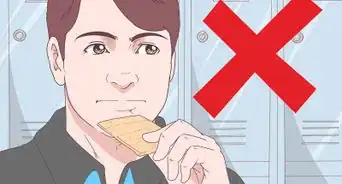
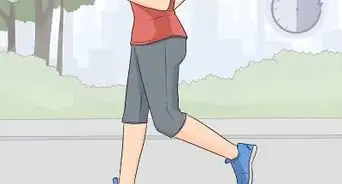
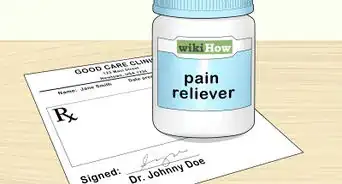
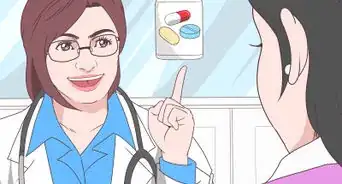

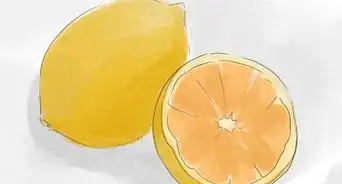
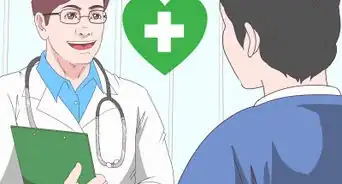
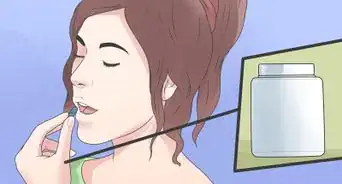
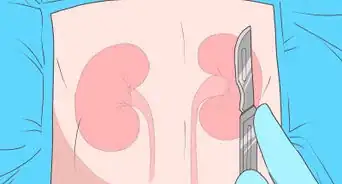
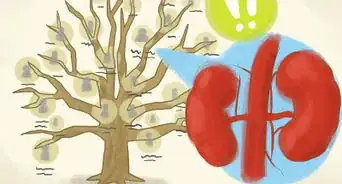
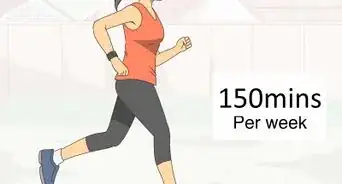








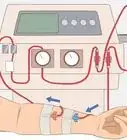
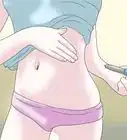
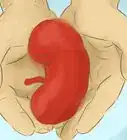
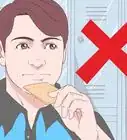



































Medical Disclaimer
The content of this article is not intended to be a substitute for professional medical advice, examination, diagnosis, or treatment. You should always contact your doctor or other qualified healthcare professional before starting, changing, or stopping any kind of health treatment.
Read More...